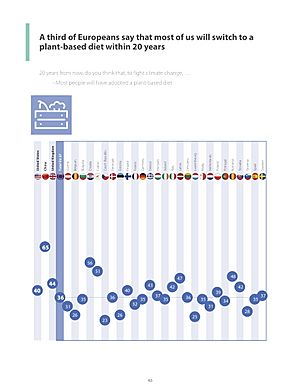Plant-based diet facts for kids
A plant-based diet is a way of eating that focuses on foods from plants. This includes vegetables, fruits, whole grains, legumes (like beans and lentils), nuts, and seeds. It means eating very few or no animal products.
A plant-based diet doesn't always mean being vegan or vegetarian. It just means that most of your food comes from plants.
What Does "Plant-Based" Mean?
The idea of a "plant-based diet" became popular thanks to T. Colin Campbell. He was a scientist from Cornell University. In 1980, he shared his research at the National Institutes of Health.
Campbell's research came from a big study called The China Project. This study looked at how people ate in rural China for ten years. It showed that eating less animal protein and fat, and more plant foods, could help prevent many diseases.
In 2005, Campbell and his son wrote a book called The China Study. This book became very popular. It talked about the health benefits of eating mostly plants. Campbell also taught people that eating meat can have a big impact on the environment.
Sometimes, people use "plant-based" to mean eating only plants. Other times, it means eating mostly plants, but still a small amount of animal products. It often means eating foods that are not heavily processed.
Why Choose a Plant-Based Diet?
Today, about 4 billion people around the world eat mostly plant-based foods. Some choose this way of eating, while others do so because of limited food or water.
People choose plant-based diets for many reasons:
- Health: They want to be healthier.
- Taste: They enjoy the taste of plant foods.
- Animals: They care about animal welfare.
- Environment: They want to help the planet.
- Weight: They want to manage their weight.
Plant-Based Diets and Our Planet
Eating a plant-based diet can help protect our environment. A sustainable diet is one that is good for our health and also good for the planet. It uses natural resources wisely and helps keep our ecosystems healthy.
Biomass of mammals on Earth Livestock, mostly cattle and pigs (60%) Humans (36%) Wild mammals (4%)
Plant-based diets can help reduce greenhouse gas emissions. These gases trap heat and cause climate change. Growing plants for food also uses less land, water, and fertilizers compared to raising animals.
A lot of the crops grown worldwide are used to feed farm animals, not humans. Eating fewer animal products helps reduce climate change and biodiversity loss. Foods like beef, lamb, and cheese have a very high carbon footprint. This means they create a lot of greenhouse gases.
Even though soy farming can cause deforestation in the Amazon rainforest, most soy is grown to feed livestock. Only a small amount is for human food. Choosing plant-based foods can also mean fewer animals are raised on factory farms.
Studies show that diets focusing on plants are better for the environment. For example, vegan, vegetarian, and pescetarian diets create less carbon pollution than typical diets that include a lot of animal products.
A 2020 study found that if the world switched to more plant-based diets, it could greatly reduce CO2 emissions. This is because plant foods need much less land and create less CO2 than meat and dairy.
A report from Chatham House in 2021 said that moving towards "predominantly plant-based diets" is needed to stop biodiversity loss. This means protecting all the different kinds of life on Earth. The report noted that about 80% of all global farmland is used for animals. Switching to plant-based diets would free up this land. This land could then be used to restore natural areas and help wildlife thrive.
Another study in 2022 found that if rich countries switched to plant-based diets, huge areas of land used for animal farming could return to nature. This could remove 100 billion tons of CO2 from the air by the end of the century. About 35% of all land where people can live is used to raise animals for food.
 | Sharif Bey |
 | Hale Woodruff |
 | Richmond Barthé |
 | Purvis Young |



